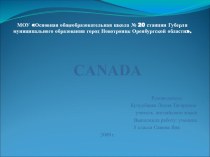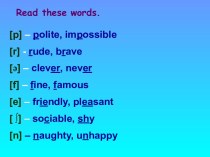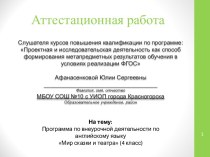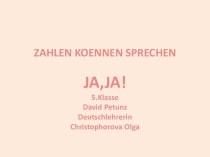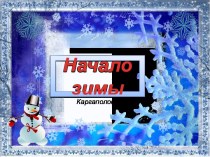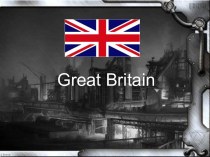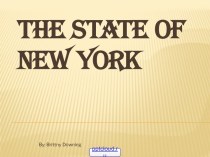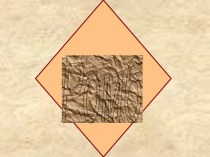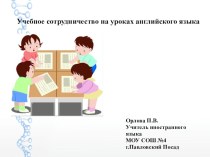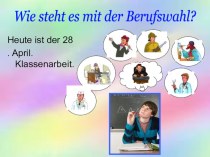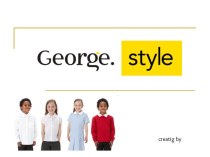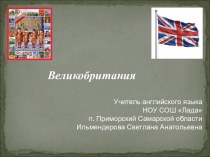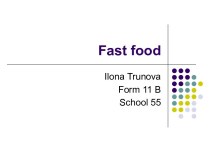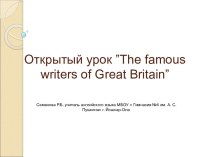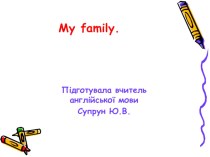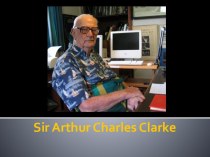Слайд 2
Demonstrative pronouns
nearer in distance or time - this,
these
further in distance or time - that, those
Demonstrative pronouns
may be subjects, predicatives, objects and attributes. As attributes they always precede the modified noun.
These are bad times (subject)
This tastes good. (subject)
The only smart people were those who did not ask the question (predicative)
Have you seen this? (object)
If that young fellow wants the truth, he shall have it. (attribute)
This is Josef speaking. Is that Mary?
That sounds like John.
Слайд 3
that/those may be used as a prop-word (word-substitute)
In
thinking of his helpless victim the expression like that
of a cat who was just going to purr stole over his face
Her actions were those of a spoilt girl (prepositional phrase)
She knew how to deal with rich people and those who were poor (clause)
This dress in not half as good as that made-to-order in Paris (participle II)
I entered by the door opposite to that opening into the garden(participle I)
Pay attention!
Demonstratives as prop-words should be followed by:
Prepositional phrases
Participles I and II
clauses
Слайд 4
Collocations with demonstratives
That will do –достаточно
That’s it! –
Верно! Попали!
That’s right! –Правильно!
That’s all right. –Не стоит.
Ничего.
those present/those concerned –присутствующие /заинтересованные лица
like this/ like that –такой/таким образом
More than that, - более того
should know better than that – надо было быть умнее, пенять на себя
But for all of that, - несмотря на это
Hardly that –Отнюдь
That’s why –вот почему
that is, -то есть/ That is? – То есть? И?
Leave it at that – остановимся на этом
So that is that –такие вот дела
That settles it -на том и порешим
this country –наша страна
Слайд 5
Collocations with such
Such may mean:
this/that kind
Indicate degree
e.g.
I would never have said such a thing about
him
He did not say any such things!
He is such a bore!
Set phrases:
Such as – например
As such –как таковой
such as it was –каково бы оно ни было
Слайд 6
Collocations with same
The same = identical
We don’t have
to sleep all in the same room
He wore the
same jeans that I had seen on him in ten years before
She gave me the same sandwich as yesterday, there wasn’t much variety on the menu
Set-phrases:
It’s all the same to me – безразлично, наплевать
do smth all the same – все равно, несмотря ни на что
Much the same –без изменений
Слайд 7
Interrogative pronouns
I keep six honest serving-men
(They taught me
all I knew);
Their names are What and Why and
When
And How and Where and Who.
I send them over land and sea,
I send them east and west;
But after they have worked for me,
I give them all a rest.
I let them rest from nine till five,
For I am busy then,
As well as breakfast, lunch, and tea,
For they are hungry men.
But different folk have different views;
I know a person small-
She keeps ten million serving-men,
Who get no rest at all!
She sends'em abroad on her own affairs,
From the second she opens her eyes-
One million Hows, two million Wheres,
And seven million Whys!
Rudyard Kipling
Слайд 8
Есть у меня шестерка слуг,
Проворных, удалых.
И все, что вижу я вокруг, -
Все знаю я от них.
Они по знаку моему
Являются в нужде.
Зовут их: Как и Почему,
Кто, Что, Когда и Где.
Я по морям и по лесам
Гоняю верных слуг.
Потом работаю я сам,
А им даю досуг.
Даю им отдых от забот -
Пускай не устают.
Они прожорливый народ -
Пускай едят и пьют.
Но у меня есть милый друг,
Особа юных лет.
Ей служат сотни тысяч слуг, -
И всем покоя нет!
Она гоняет, как собак,
В ненастье, дождь и тьму
Пять тысяч Где, семь тысяч Как,
Сто тысяч Почему!
Перевод С Маршака
Слайд 9
Interrogative pronouns
Interrogative pronouns are used to form
special questions. They are: who/whom, whose, what, which, how
much and how many
Who refers to human beings:
e.g. Who is coming with me?
Who are the people over there?
Whom does he suspect?
Whom did you give the message to?
What usually refers to things but it may be applied to persons when one inquires about their occupation
e.g. "What are you looking for, Tess?" the doctor called. "Hairpins,“ she replied...
"What was he?" "A painter.“
When what is used as an adjective pronoun it serves as an attribute to nouns denoting both persons and things.
e.g. What languages do you know?
What man would have done more?
Which has a selective meaning. It may refer to persons and things.
e.g. Which of us does he mean?" gasped Huckleberry.
Which side of the bed do you like?
Слайд 10
The idiomatic use of what
e.g. "What is he
like?" "He is tall, dark and handsome." (Как он
выглядит?)
What is he like as a pianist?" "Oh, he is not very good." (Что он
собой представляет как...)
Ben suddenly looked at his watch. "What about your dentist?'5,
he asked. (А как же твой врач?)
What about something to eat? (Может мы поедим чего-нибудь?) What about his brother? (Что слышно о его брате?)
What of it? (Ну и что из этого?) So what? (Ну и что?)
He's a clever fellow, he knows what's what, (что хорошо, что плохо; что к чему)
Слайд 11
Compare the use of what and which
what –
какой
which- который из
What TV programs do you usually watch? Which of them is your favourite?
What examinations are you going to take this term? Which of them do you find most difficult?
What car do you have? Which car is yours?
Слайд 12
Relative pronouns
(who, whose, which, that, as)
Relative pronouns not
only point back to a noun or a pronoun
mentioned before but also have conjunctive power. They introduce attributive clauses. The word they refer to is called their antecedent. It may be a noun or a pronoun.
Who is used in reference to human beings or animals.
Whose is mainly used in reference to human beings or animals, but it may be applied to things.
Which is used in reference to things and animals.
That is mainly used in reference to animals and things. It may also be used in reference to human beings
Слайд 13
Relative pronouns: examples
Jolyon bit his lips; he who
had always hated rows almost welcomed the thought of
one now.
Mere was her own style—a bed which did not look like one and many mirrors.
They strove to steal a dog — the fattest, which was very thin.
On one side was a low wall that separated it from the street
Perhaps the books were right and there were many such as she in the upper walks of life.
Слайд 14
When the antecedent is a collective noun, the
relative who is used when the individuals forming the
group are meant, and the relative which is used when the group as such is meant.
e.g. He wanted to interview someone from the team who were now resting (noun of multitude)
He wanted to interview someone from the team which was winning (collective noun
Which is also used if the antecedent of the attributive clause is the whole of the principal clause.
Compare:
e.g. He invited us to dinner, which was very kind of him.
He invited us to dinner that was very expensive
Слайд 15
That (not who/which/what) is used
after most indefinite pronouns,
e.g.
Have you got all that you need?
Sylvia had always had everything that she wanted.
There is not much that can be done.
after nouns modified by an adjective in the superlative degree as well as by first or last,
e.g. Yesterday was one of the coldest days that I've ever known.
It was the first time that he heard of the episode.
after a noun modified by same,
e.g. She wore the same dress that I had seen her in at her sister's wedding.
when the antecedent is both a person and a thing,
e.g. He talked of the people and the places that he had visited.
Unlike who and which, that cannot be preceded by a preposition.
e.g. This is the letter about which I told you.
This is the letter that I told you about.
















